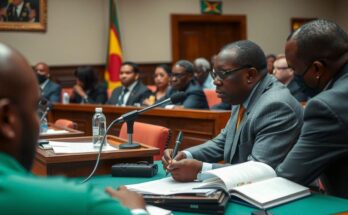Equatorial Guinea’s history is profoundly marked by Francisco Macias Nguema Biyogo’s dictatorship, which spanned from independence in 1968 until his overthrow in 1979. His oppressive regime dismantled educational and healthcare systems, established a ruthless cult of personality, and perpetuated severe socio-economic disparities. Today, despite oil wealth, the nation continues to struggle with poverty and inequality, resulting from the tyrannical legacy that has persisted across generations and into the current rule of his nephew, Teodoro Obiang.
The story of Equatorial Guinea is marred by the legacy of Francisco Macias Nguema Biyogo, a ruler whose reign of terror transformed the nation from a potential asset into a showcase of human suffering. Gaining independence on October 12, 1968, Nguema quickly established himself as a dictator, consolidating power and dismantling educational and medical advancements achieved during colonial rule. His governance was marked by bizarre and cruel edicts, including the complete prohibition of private education and the ban on Western clothing and medicine, as he sought to create a cult of personality centered on himself. While he proclaimed titles such as “The Unique Miracle” and curtailed any intellectualism, he imposed severe penalties for dissent, including executions and long prison sentences. Nguema’s psychological instability was evident in his strange practices, such as the mandatory shutdown of electricity in his absence. His tenure ended violently in 1979 when he was overthrown by his nephew, Teodoro Obiang Nguema Mbasogo. Despite Nguema’s exile and execution that followed, his oppressive legacy persisted under his nephew, who has ruled Equatorial Guinea with an iron grip since. Today, Equatorial Guinea, though endowed with substantial oil wealth, continues to grapple with severe socio-economic disparities. Despite a nominally rich GDP, the vast majority of its 1.8 million citizens remain impoverished, reflecting the long-standing effects of Nguema’s tyrannical rule, which perpetuated poverty rather than prosperity. As the nation approaches its 58th independence anniversary, the shadows of past leadership loom large, threatening any progress in governance and human development.
Equatorial Guinea became independent from Spanish colonial rule in 1968, entering a period that would soon be dominated by the authoritarian regime of Francisco Macias Nguema Biyogo. This era is crucial in understanding the nation’s subsequent political and social challenges. Nguema, despite his limited education, quickly ascended to power and would become infamous for his brutal leadership style characterized by pervasive human rights violations and an irrational governing approach. The foundation of his tyranny was laid through the establishment of a complete autocracy, where dissent was crushed, and public life was infused with a disturbing cult of personality. His policies not only impoverished the population, leading to significant deprivation, but also stifled education and health care, two critical sectors necessary for national development.
The legacy of Francisco Macias Nguema Biyogo remains a significant burden for Equatorial Guinea as it marks 58 years of independence. His rule exemplified the potential for tyranny in post-colonial Africa and the devastating impacts of dictatorship on national progress and human welfare. Although the country has access to considerable wealth through its oil reserves, the stark contrast between national affluence and widespread poverty perpetuates an unstable socio-political environment. As the current regime faces the challenge of overcoming historical injustices, the need for equitable governance and the bolstering of civil rights becomes critical for the future of Equatorial Guinea.
Original Source: www.monitor.co.ug




